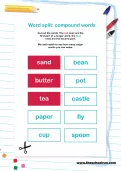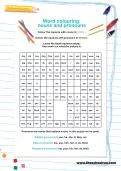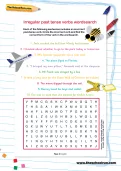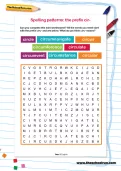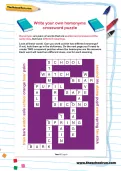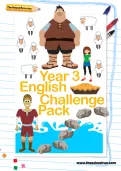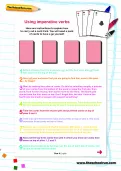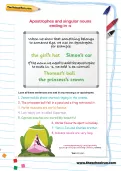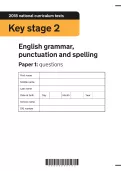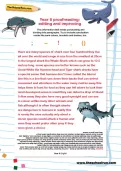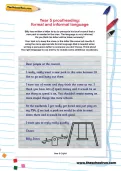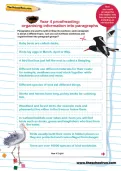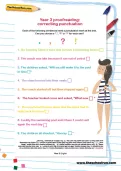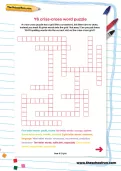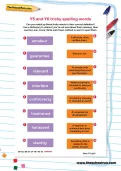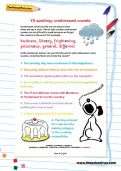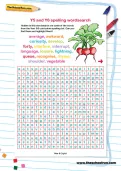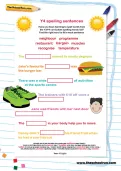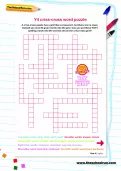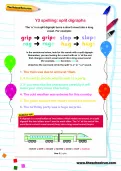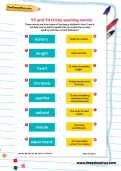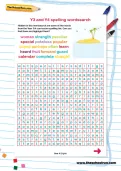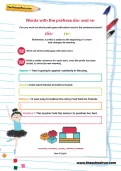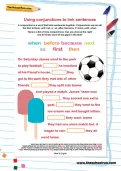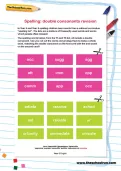Ks2 English worksheets
Free worksheets: Word puzzles, KS2
You’ll need to login or Register first to access these worksheets for free.
Once you’ve tried out our free worksheets, why not explore all our resources (1000s of worksheets, interactive tutorials, learning packs and more) with a 14-day FREE trial subscription.
Word split: compound words
A mix and match puzzle created by teachers, using compound words, to support primary school literacy and demonstrate examples of compound words.
Word colouring: nouns and pronouns
Colour the squares with nouns in green. Colour the squares with pronouns in brown. Leave the blank squares empty, then work out what the picture is.
Irregular past tense verbs wordsearch
A fun and free activity created by an experienced teacher with the aim of teaching KS2 children about irregular past tense verbs. Each of the sentences on the worksheet includes an incorrect past-tense verb. Circle the incorrect verb and then find the correct form of the verb in the wordsearch.
Spelling patterns: the prefix cir-
Can you complete this mini-wordsearch? All the words you need start with the prefix circ- and are below. What do you think circ- means?
Write your own homonyms crossword puzzle
Homonyms are pairs of words that are spelled and pronounced the same way, but have different meanings. Look at these words. Can you work out the two different meanings?
If not, look them up in the dictionary. On the next page you’ll need to create TWO crossword puzzles where the homonyms are the answers. Each word will need two different clues, one for each meaning.
If not, look them up in the dictionary. On the next page you’ll need to create TWO crossword puzzles where the homonyms are the answers. Each word will need two different clues, one for each meaning.
Year 3 English Challenge Pack
Challenging reading comprehensions and activities for Year 3 readers and writers, designed to stretch your child and offer them the opportunity to explore their year-group topics in greater depth.
Using imperative verbs
Learn a card trick to amaze friends and family and practise identifying and using imperative verbs in this Y4 activity worksheet.
Apostrophes and singular nouns ending in -s
When a noun we want to add an apostrophe to ends in -s we add 's to show possession, according to the national curriculum. Practise the rule by punctuating some sentences.
Key Stage 2 - 2018 English SATs Papers
Help your child prepare for the Year 6 English SATs, taken at the end of Key Stage 2, with some revision and at-home practice. These complete 2018 Y6 SATs past papers are the official past papers from the Department for Education, used in schools.
Year 6 proofreading: editing and improving
This information text needs punctuating and dividing into paragraphs. Try to include punctuation marks like semi colons, brackets and dashes, too.
Year 5 proofreading: formal and informal language
Billy has written a letter to try to persuade his local council that a new park is needed in the area. The language is very informal. Do you think his letter will be taken seriously? Your task is to keep the ideas in the letter the same but rewrite it using the more appropriate formal language that is needed when writing a persuasive letter to someone you don’t know.
Year 4 proofreading: organising information into paragraphs
Paragraphs are used to split writing into sections; each paragraph is about a different topic. Can you cut out these sentences and organise them into paragraph groups?
Year 3 proofreading: correcting punctuation
Each of the following sentences need a punctuation mark at the end. Can you choose a “.”, “?” or “!” for each one?
Y6 criss-cross word puzzle
A criss-cross puzzle has a grid like a crossword, but there are no clues; instead you must fit given words into the grid. Not easy! Can you put these Y5/Y6 spelling words into the correct slot on the criss-cross grid?
Y5 and Y6 tricky spelling words
Can you match up these tricky words to their correct definition? Use a dictionary to check if you’re not sure about their meaning, then use the Look, Cover, Write and Check method to learn to spell them.
Y5 spelling: unstressed vowels
In these sentences, can you find the words with unstressed vowel sounds, underline them and circle the sound?
Y5 and Y6 spelling wordsearch
Hidden in this wordsearch are some of the words from the Year 5/6 curriculum spelling list. Can you find them and highlight them?
Y4 spelling sentences
Have you been learning to spell words from the Y3/Y4 curriculum spelling words list? Find the right word to fit in each sentence.
Y4 criss-cross word puzzle
A criss-cross puzzle has a grid like a crossword, but there are no clues. Instead you must fit given words into the grid. Can you put these Y3/Y4 spelling words into the correct slot on the criss-cross grid?
Y3 spelling: split digraphs
In these sentences, look for the words with a spilt digraph. Remember, you are looking for a word with an ‘e’ at the end that changes a short vowel sound into a long vowel sound (for example, mad becomes made).
Y3 and Y4 tricky spelling words
These words are from some of the topics studied in Year 3 and 4, but they can be hard to spell! Can you match the correct spelling with the correct definition?
Y3 and Y4 spelling wordsearch
Hidden in this wordsearch are some of the words from the Year 3/4 curriculum spelling list. Can you find them and highlight them?
Words with the prefixes dis- and re-
Work out which prefix goes with each word. Then write a similar sentence for each word, once the prefix has been added, to show its new meaning.
Using conjunctions to link sentences
A conjunction is a word that links sentences together. Conjunctions we use all the time include: and, but, or, so, after, because, if, since, until, when. Here is a list of time conjunctions. Can you choose the right one to fit into each of the gaps in the text?
Spelling: double consonants revision
The spelling words below, from the Y5 and Y6 list, all include a double consonant. Can you cut out the cards and arrange them to make a whole word, matching the double consonant on the first card with the end sound on the second card?
